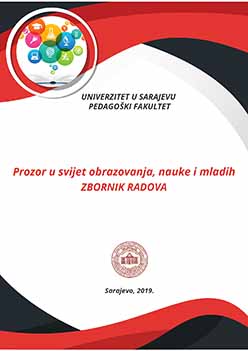VREDNOVANJE UČENIKA S TEŠKOĆAMA U PONAŠANJU:
RAZLIKE S OBZIROM NA POHAĐANJE REDOVITOG I
PRIMJERENOG OBLIKA ŠKOLOVANJA
EVALUATION OF PUPILS WITH BEHAVIORAL DIFFICULTIES:
DIFFERENCES REGARDING THE ATTENDANCE OF REGULAR
AND APPROPRIATE FORMS OF SCHOOLING
Author(s): Nataša Vlah
Subject(s): Inclusive Education / Inclusion
Published by: UNIVERZITET U SARAJEVU – PEDAGOŠKI FAKULTET
Keywords: pupils with behavioral difficulties; evaluation; primary school; appropriate form of schooling;
Summary/Abstract: The objectives of the paper were to find out, in students with difficulties, the relationship between school grades and attending classes based on a decision on appropriateform of schooling, and to analize whether the teachers' actions differ in evaluating the achievement of such pupils by the form of schooling. In 125 primary schools in Croatia, volunteer and anonymous self-assessments were conducted with the Scale of Educational Teaching Strategies (Kovacic & Vlah, 2018). Classteachers assesed their teaching with 1277students (N = 1026; Mage = 43; 86% women). It was a selected group of pupils from the first to the eighth grade that the classmates have detected behavioral difficulties, irrespective of the type of program they were attending, and subsequently a dichotomous variable was used to document theofficial solution of appropriate schooling (YES / NO). Two hypotheses were tested by a hi-quadratic test, discriminatory analysis, and frequency of fundamental results.30% of students in the sample have official solutions for an appropriate form of schooling. Proportionally, there are more pupils of very good and excellent success among those who lack the official document of appropriate form of schooling, and relatively there are more students who have sufficient and good success among those who have the official document of appropriate form of schooling. These two subgroups of disadvantaged students also differ in 23% variance regarding to the methods of evaluating their achievements in a way that teachers more often apply customized and individualized evaluating strategies to students with appropriate forms of schooling.Despite the fact that the teachers more often apply the customized forms of evaluation to students who have official document of appropriate form of schooling, the same students have weaker grades than students who do not have such documents. The results are discussed in the context of teacher competency for prescribed and recommended methods and techniques of appropriate evaluation and assessment as well as level and intensity of behavioral difficulties in pupils. Since our basic approach on the concept of protecting the fundamental human rights of every student for an appropriate form of education, it is essential that such research will be carried out further to determine the possibilities of improving the educational practice for students with a greater intensity behavior.
Book: Prozor u svijet obrazovanja, nauke i mladih
- Page Range: 603-619
- Page Count: 17
- Publication Year: 2019
- Language: Croatian
- Content File-PDF

